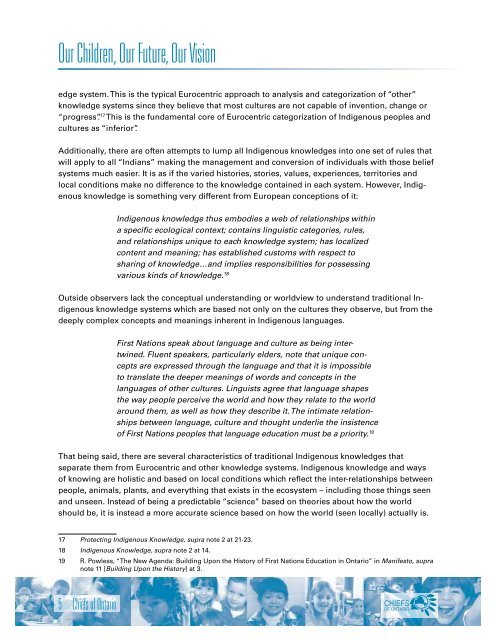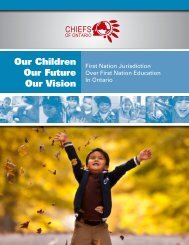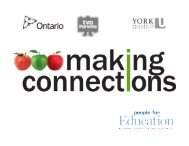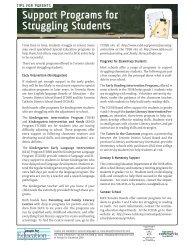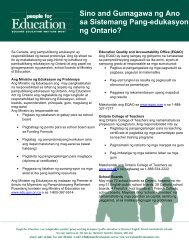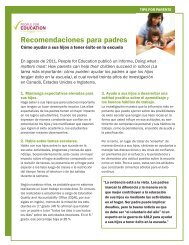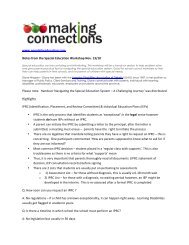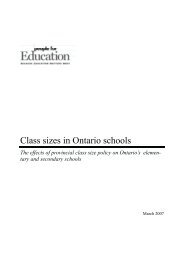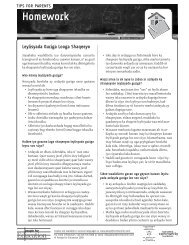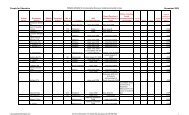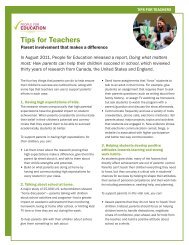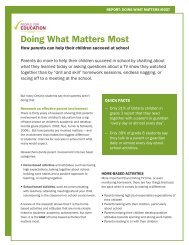Our Children Our Future Our Vision - People for Education
Our Children Our Future Our Vision - People for Education
Our Children Our Future Our Vision - People for Education
You also want an ePaper? Increase the reach of your titles
YUMPU automatically turns print PDFs into web optimized ePapers that Google loves.
<strong>Our</strong> <strong>Children</strong>, <strong>Our</strong> <strong>Future</strong>, <strong>Our</strong> <strong>Vision</strong><br />
edge system. This is the typical Eurocentric approach to analysis and categorization of “other”<br />
knowledge systems since they believe that most cultures are not capable of invention, change or<br />
“progress”. 17 This is the fundamental core of Eurocentric categorization of Indigenous peoples and<br />
cultures as “inferior”.<br />
Additionally, there are often attempts to lump all Indigenous knowledges into one set of rules that<br />
will apply to all “Indians” making the management and conversion of individuals with those belief<br />
systems much easier. It is as if the varied histories, stories, values, experiences, territories and<br />
local conditions make no difference to the knowledge contained in each system. However, Indigenous<br />
knowledge is something very different from European conceptions of it:<br />
Indigenous knowledge thus embodies a web of relationships within<br />
a specific ecological context; contains linguistic categories, rules,<br />
and relationships unique to each knowledge system; has localized<br />
content and meaning; has established customs with respect to<br />
sharing of knowledge…and implies responsibilities <strong>for</strong> possessing<br />
various kinds of knowledge. 18<br />
Outside observers lack the conceptual understanding or worldview to understand traditional Indigenous<br />
knowledge systems which are based not only on the cultures they observe, but from the<br />
deeply complex concepts and meanings inherent in Indigenous languages.<br />
First Nations speak about language and culture as being intertwined.<br />
Fluent speakers, particularly elders, note that unique concepts<br />
are expressed through the language and that it is impossible<br />
to translate the deeper meanings of words and concepts in the<br />
languages of other cultures. Linguists agree that language shapes<br />
the way people perceive the world and how they relate to the world<br />
around them, as well as how they describe it. The intimate relationships<br />
between language, culture and thought underlie the insistence<br />
of First Nations peoples that language education must be a priority. 19<br />
That being said, there are several characteristics of traditional Indigenous knowledges that<br />
separate them from Eurocentric and other knowledge systems. Indigenous knowledge and ways<br />
of knowing are holistic and based on local conditions which reflect the inter-relationships between<br />
people, animals, plants, and everything that exists in the ecosystem – including those things seen<br />
and unseen. Instead of being a predictable “science” based on theories about how the world<br />
should be, it is instead a more accurate science based on how the world (seen locally) actually is.<br />
17 Protecting Indigenous Knowledge, supra note 2 at 21-23.<br />
18 Indigenous Knowledge, supra note 2 at 14.<br />
19 R. Powless, “The New Agenda: Building Upon the History of First Nations <strong>Education</strong> in Ontario” in Manifesto, supra<br />
note 11 [Building Upon the History] at 3.<br />
5 Chiefs of Ontario


